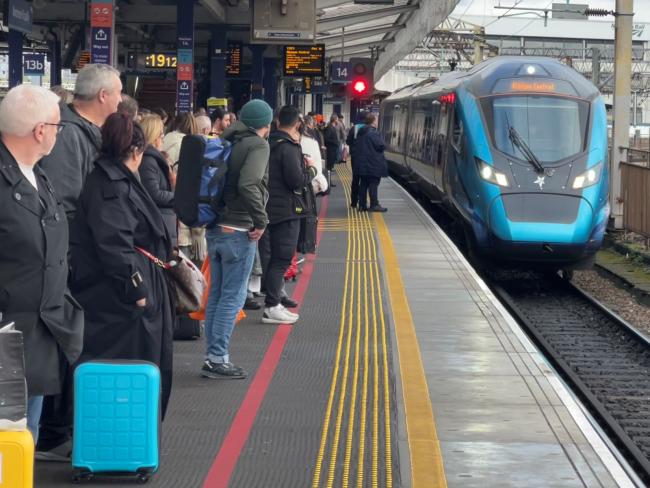1 June 2025

Passengers keen to board a Transpennine train at Manchester Piccadilly station. Service has improved, but more investment is needed. Photo Workers.
The government took operating company South West Railway (SWR) into public ownership on Sunday 25 May. Rail union RMT welcomed this move, but says there’s much more to do.
SWR joined Southeastern, Transpennine, LNER and other passenger operators now run by the Department for Transport’s operating arm,. These will eventually be transferred to a state-owned company, Great British Railways.
Significant
Other operators have been nationalised in the recent past because of performance issues. But the transfer of SWR is significant because it is the first to be nationalised as part of the government’s policy to bring all operators into public ownership.
The next operator to be nationalised will be c2c on 20 July, then Greater Anglia on 12 October. After that, the plan is to transfer one operator every 3 months or so. All of them will be transferred by the end of 2027.
Private hands
Passenger operators besides, much of the railway privatised in the 1990s will still be in private hands. Most of the rail freight sector is private. Many support functions in areas such as cleaning and engineering remain outsourced.
Crucially, passenger operators will still have to lease their trains from the highly profitable train leasing companies. And private open access operators such as Lumo will still run some passenger services in competition to the nationalised operators. The Labour manifesto didn’t suggest any change on either score.
Campaigning
Rail union RMT has campaigned vigorously for the renationalisation of these areas, particularly cleaning and security, pointing to highly profitable companies that employ staff on low wages without sick pay or decent pensions.
RMT General Secretary Eddie Dempsey described the return of SWR to public ownership as a major step forward and a rejection of the failed privatisation model. He went on to say, “But the job is incomplete when our contracted-out members remain outsourced and not reaping the benefits of nationalisation…Labour has promised a wave of insourcing and we call on them to act now.”
No guarantee
Although Transpennine has seen performance improvements since nationalisation, but that’s just a start. RMT members are well aware that public ownership is of itself no guarantee of continued efficient passenger services, as is clear from experience with ScotRail and Transport for Wales, both government-owned.
Rail users will want to see much more from government, including significant investment in areas such as electrification and more affordable fares. There is much more to do.
